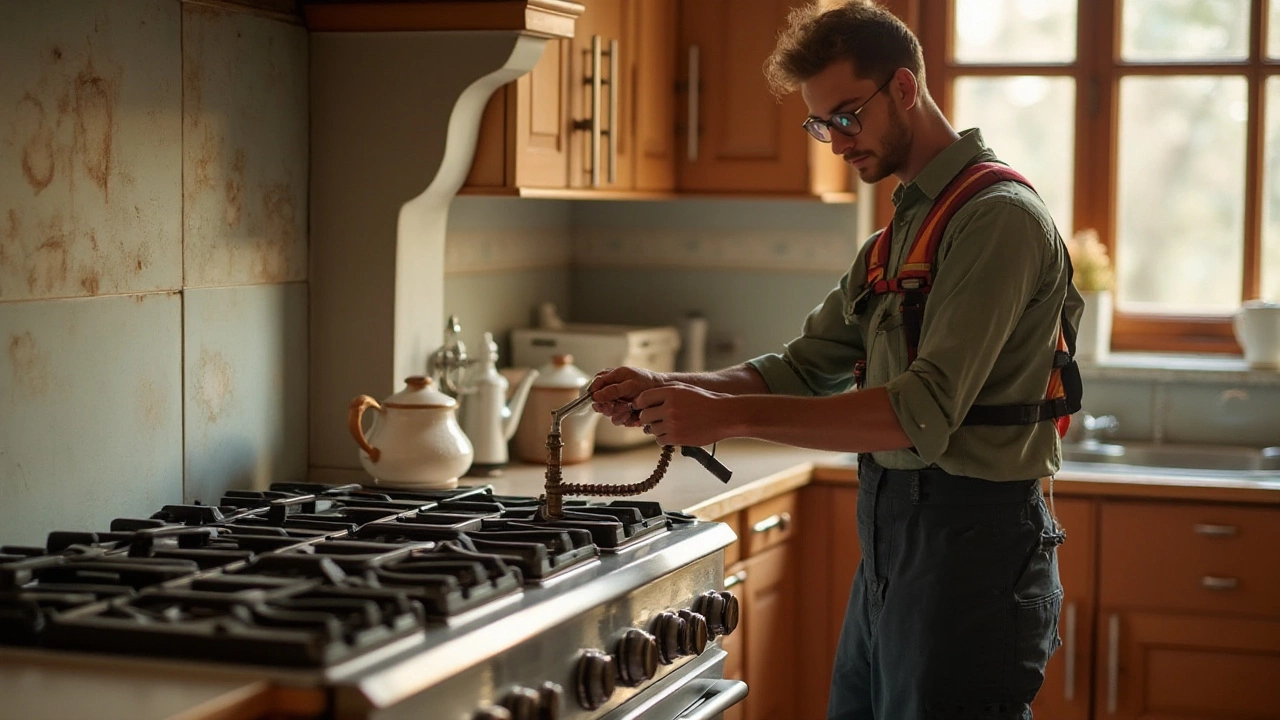Gas appliances are often treated as the silent workhorses of our homes, keeping us warm and comfortable. Yet, like any diligent companion, they need a bit of care and attention to keep performing at their best. We wouldn't want to overlook anything concerning when it comes to gas! So, how do we ensure these vital appliances remain in tip-top shape? By checking them regularly, of course.
From understanding why routine inspections matter to recognizing the red flags, this article will guide you through the ins and outs of maintaining your gas-powered friends. Not only will this make your home safer, but it can also save you money in the long run. Let's explore the do's and don'ts of gas appliance maintenance, so you can enjoy peace of mind and continued comfort in your living space.
- Significance of Regular Checks
- Recommended Inspection Frequency
- Identifying Warning Signs
- DIY Tips and Professional Help
- Prolonging Appliance Lifespan
Significance of Regular Checks
It’s often easy to take the silent reliability of our gas appliances for granted. But beneath their calm exterior lies a world of complex mechanisms, intricate piping, and immense energy. Regular checks are not just a wise choice; they are essential for the wellbeing of your home and family. First and foremost, safety is paramount. Gas leaks, though rare, can present serious health risks including carbon monoxide poisoning. Unexpected leaks can damage property and endanger lives, making routine inspections a critical part of responsible home management.
Beyond safety, there is the aspect of energy efficiency. An appliance working at its best not only saves you money on your utility bill but also contributes to a greener planet. Regular inspections ensure that the burner's efficiency is optimal, reducing unnecessary consumption of resources. Moreover, well-maintained appliances generally have a longer lifespan, allowing homeowners to postpone costly replacements. Recognizing minor issues before they evolve into significant problems can prevent service disruptions and unattractive renovation costs down the line. The peace of mind that comes from knowing your appliances have been expertly maintained is invaluable.
Maintenance is also a ticket to compliance. Many regions have laws and regulations mandating regular checks of gas appliances, especially in rental properties or multi-unit dwellings. Compliance keeps landlords safe from legal disputes and tenants safe from unexpected hazards. According to a report by the Gas Safe Register, “over half a million illegal gas jobs have been carried out each year.”
"Routine maintenance isn't just about extending appliance life; it's about ensuring their existence continues to be a benefit rather than a burden," says Robert Hastings, a seasoned appliance safety consultant.
Regular gas appliance checks serve as a preventive measure that saves heartache, money, and time. While they do require a bit of effort and cooperation between homeowners and professionals, the benefits are unequivocal. Establishing a schedule for these assessments is a testament to good home management and an opportunity to model responsible behavior for younger generations who live in or visit the home.
Recommended Inspection Frequency
Regularly inspecting your gas appliances can seem like just another item on the never-ending household to-do list, but it's a small task that yields profound peace of mind. How often do should these inspections occur, you might wonder? It largely depends on the appliance, age, and usage patterns. Generally, a thorough check-up once a year is advised, especially before the heavy-use seasons like winter for heaters. This timing ensures that they perform optimally when you need them most.
Seasoned professionals often recommend scheduling these inspections during the warmer months when demand for servicing technicians isn't as high, and you're less likely to encounter a backlog. During these inspections, technicians examine various components for wear, leaks, or other potential issues. But why settle for professional intervention only? By taking note of manufacturer recommendations specific to your model, and applying them with insight, homeowners can maintain a proactive stance.
Most manufacturers suggest annual check-ups as a baseline; for instance, the Consumer Product Safety Commission concurs with this, asserting that, "annual professional inspections can significantly reduce the risks of gas leaks and prolong the appliance’s life."
It's essential to follow this guideline rigorously not just for safety, but also for the sake of efficiency, as neglected appliances can silently waste energy, ramping up costs.By adhering to these timelines, users can nip potential problems in the bud before they escalate.
Avoiding unnecessary expenses is another upside of these routine checks. Gas appliances are not only expensive but critical to day-to-day operations in homes. Ensuring their longevity saves both money and the hassle of emergency repair services, which often cost a pretty penny. Also, when these appliances function optimally, there’s a ripple effect; they consume energy more efficiently, directly impacting monthly utility bills. Routine maintenance isn't just about maintaining functionality. It's sincerely about efficient performance and enduring safety.
But, how about older appliances? Appliances over ten years old may necessitate inspections more frequently, as they are prone to wear and tear. So, plan for biannual inspections to ensure these grand oldies do not become threats. Keeping a record of these inspections is like having a medical history, allowing technicians to diagnose and remedy problems effectively over time.
For those equipped with a keen eye and some basic tools, there's an added layer of protection: the homeowner's self-inspection. Although it shouldn't replace professional services, monthly visual checks for any strange noises, visible damage, or the notorious odor of gas can be critical. These quick checks serve as a whistle-stop tour of ensuring immediate safety and peace of mind.

Identifying Warning Signs
When it comes to gas appliances, subtle warning signs can often hint at bigger issues looming on the horizon. Recognizing these signs early not only prevents more extensive damage but also safeguards you and your loved ones from potential dangers. One of the primary indicators that something might be amiss is an unusual odor. Most of us are familiar with the sulfuric, rotten egg smell that signifies a gas leak. If detected, it’s crucial to evacuate the area immediately and contact emergency services. It’s always better to err on the side of caution when it comes to gas safety.
Another red flag is a change in the color of the flame. Normally, your gas stove or heater should emit a steady blue flame. A yellow or orange flame is a sign that the gas isn't burning efficiently. This inefficiency can lead to increased carbon monoxide levels, a harmful byproduct that’s both colorless and odorless, making it especially dangerous. Investing in carbon monoxide detectors in your home should be a top priority for anyone using gas appliances. These devices can alert you to dangerous levels of gas before they become life-threatening.
Unusual noises are another sign that demands your attention. While a gentle hum is normal, loud banging or clanking noises are not. Whether it’s your water heater or furnace making the racket, it might suggest a component is loose or even broken. Ignoring these sounds might place undue stress on other parts of the appliance, causing a domino effect of malfunctions. Listening to your appliances can save both time and money in the long run.
If your appliances are taking longer than usual to heat up, this can also serve as a signal. A once quick-to-heat oven that now takes twice the time to reach a specific temperature might have underlying issues often related to gas flow or burner problems. These performance changes can hike up your energy bills and mean it’s time for a maintenance check. Regular servicing can diagnose and remedy such inefficiencies, restoring the appliance to its optimal functionality.
A less discussed yet equally important warning sign is physical indicators in the home environment, such as unexplained soot or scorch marks around the appliance. These marks might suggest that there have been combustion issues or overheating. Such conditions can elevate fire risks and should be addressed post-haste. Additionally, if windows start gathering a lot of condensation or you notice mold growth, it could be clues of high humidity levels stemming from an appliance malfunction.
"Safety should be of utmost priority when dealing with gas appliances," states the National Fire Protection Association. Ensuring regular inspections can prevent more dangerous scenarios from developing.
And let's not discount the invaluable feedback of our own physical senses. If you or any of your family members start experiencing symptoms like headaches, dizziness, or nausea primarily when at home, it could be an indication of improper gas appliance operation. Carbon monoxide poisoning, in particular, can manifest with these symptoms. Immediate medical attention coupled with having your appliances checked should be priorities in such cases. Remember, being proactive about your gas appliance safety not only protects your property but ensures peace of mind for everyone in the household.
DIY Tips and Professional Help
When it comes to gas appliances, taking a hands-on approach can not only be rewarding but also crucial for maintaining safety and efficiency in your home. DIY tasks are a way to familiarize yourself with your appliances, but it's paramount to know your limits. Always ensure you're tackling right-sized tasks!
Before starting, it's good practice to have the appliance manual handy – it often has specifics that are gold when it comes to troubleshooting. Bi-annually, you might want to visually inspect your gas appliances for any obvious issues. Look for disconnects or cracks in hoses, check that the flame is blue, which is a strong indicator of proper combustion. A yellow tip on the flame may signify inefficiencies or carbon monoxide production.
Cleaning is an easy upkeep task. Keeping burners and nearby areas free of dust is essential, not just aesthetically, but functionally. Blocked burners can affect efficiency and even pose safety risks with gas accumulation. You can gently scrub burnt-on residues with a non-abrasive brush. Avoid commercial cleaners that may leave residues; instead, a homemade solution of vinegar and water often works wonders.
When to Call in the Pros
No matter how DIY-savvy you are, some problems are simply beyond home fixing. Complex issues like gas leaks, unexplained noises, or persistent odor of gas should always prompt a call to the professionals. Recall that gas appliances are not just like any other household gadget – there’s a degree of risk involved with handling gas systems. Experts possess the tools and training to manage these hazards safely.
"A stitch in time saves nine," remarked by Sarah Dorsey, a seasoned home maintenance expert, emphasizes tackling minor issues early to prevent costly repairs.
Some repairs, especially involving ignition systems or replacements of defective parts, are best left to certified gas technicians. Regular professional inspections, at least annually, are advisable to verify the overall condition of your gas appliances. They might uncover issues that aren’t visible at a superficial level, offering recommendations on when it's time to consider upgrades or replacements.
Stats on Professional Maintenance
Interestingly, recent studies suggest that homes regularly serviced by professionals have a 20% lower risk of encountering gas-related accidents. Here's a concise summary of the data:
| Category | Risk Reduction Percentage |
|---|---|
| Regular DIY Check-ups | 10% |
| Professional Inspections | 20% |
Ultimately, balancing DIY care with professional insights leads to a healthier, safer home. It ensures that your gas appliances continue to serve reliably, saving your time and resources in the long run. So, roll up your sleeves but know when to let the experts take charge!

Prolonging Appliance Lifespan
When it comes to extending the life of your gas appliances, consistent care and attention can make a world of difference. It starts with understanding your appliance's specific maintenance requirements, as outlined by its manufacturer. Each model might have its own quirks, but the universal rule remains: treat your appliances kindly, and they'll reward you with years of service. For instance, a gas stove that’s regularly cleaned and checked for gas leaks not only reduces safety risks but also performs more efficiently. This could mean wiping down burners, descaling components, and ensuring that ventilation parts are unobstructed. A clean appliance runs smoother and uses less energy because it's optimized to work just as it was designed.
The frequency of professional servicing is another vital factor. While some owners might feel skilled enough to handle minor maintenance tasks, calling in a professional at least once a year ensures that nothing is missed. These experts can spot hidden issues that you might not be aware of, like an unnoticeable but persistently leaking gas line or a pressure problem in your heating system. It's not just about stopping problems in their tracks but about keeping everything in prime condition before it even begins to degrade. You'd be surprised how a loose connection or a dirty filter can affect the entire system, leading to higher bills or, worse, sudden breakdowns.
Safety inspections are essential, of course. However, an often-overlooked aspect is the role of environment in appliance longevity. A dry, clean, and well-ventilated area is crucial. Moisture from humid climates or a dusty basement can accelerate wear and tear. Sometimes, it’s as simple as moving your appliance to a better location or ensuring there’s adequate air circulation around it. Small changes can improve efficiency remarkably. As a bonus, you'll likely notice a decline in those pesky odors that sometimes accompany older machinery, providing a fresher living environment.
"Regular maintenance turns your gas appliances from mere machines into enduring allies," says a renowned expert from The American Gas Association, emphasizing the importance of sustained care.
Keeping a record of all maintenance activities is another smart move. This could include jotting down dates of professional check-ups, any parts replaced, and adjustments made. Such records can be invaluable not just for ensuring tasks are done timely but also for resale value or insurance purposes. Should you sell your home, a history of diligent care might just persuade potential buyers who prioritize safety and reliability. Hence, when it comes to gas appliance upkeep, being proactive pays dividends both in extended lifespan and potential future transactions.
Finally, don’t underestimate the power of listening to your appliances. Strange noises, persistent odors, or unexplained errors on digital displays are immediate calls for investigation. These signs are often the earliest indicators of issues that, if left unchecked, could shorten appliance lifespan dramatically. By acting quickly when these symptoms arise, you can avoid costly repairs or replacements. Remember, a vigilant attitude keeps not only your home safer but also saves you from unpredictable expenses that always seem to come at the worst times. Having a harmonious relationship with your gas appliances will pay off, ensuring they remain a reliable part of your home environment for as long as possible.


